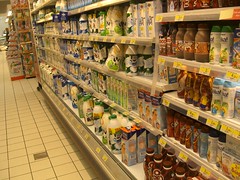Following on from a recent post about the novel Greek food products entering the Greek food market both in Greece and abroad, it was recently revealed in an article by Rebecca Mead in the New Yorker that the founder of Chobani now regrets calling his product "Greek yoghurt"; he wishes he had called it "strained yoghurt" instead, which is what Greek yoghurt is supposed to be, the element that differentiates it from other forms of yoghurt. But in the US where Chobani operates, yoghurt can be labelled Greek even if it isn't produced in Greece, or even made from Greek raw ingredients. So what exactly is Greek food, then, if you can label a product Greek no matter where you find yourself in the world?
In reality, that is, strictly speaking, not possible everywhere. Whereas you can call a non-Greek yoghurt Greek in the US and Australia, you can't do that in the UK. So Chobani yoghurt can't be sold in the UK as Greek yoghurt. In the UK, Chobani labels its yoghurt as 'strained' (even when it's got strawberries sitting on its bottom). What is being labelled as 'Greek yoghurt' around the world highlights the issue of Greek food labelling: the 'Greek yoghurt' label rarely denotes yoghurt made in Greece, and it is never made with Greek milk to begin with when it is made abroad, where there is a Greek food craze, especially concerned with yoghurt.
So what exactly do we mean when we talk about a Greek food product? This is an issue that I discussed at the 2nd Symposium of Greek Gastronomy: Food, Memory and Identity in Greece and the Greek Diaspora:

If you look carefully at the labels on the fresh meat sold at the supermarket butcher's counter, you will notice that it says 'ΕΛΛΗΝΙΚΟ' (meaning 'Greek') or 'ΕΓΧΩΡΙΟ' (meaing 'domestic'). Greek meat is often regarded as meaning the meat from an animal born/raised/killed in Greece. But some fine print often accompanies even the basic labels. Beef sold in Cretan supermarkets, for instance, is often 'born' in France, where it was 'raised' up to 5 months old, after which it is brought into Greece where it continues to be raised, until it is finally 'slaughtered' in Greece. The meat from such animals is sold as 'Greek' meat. The recent horsemeat scandal has heightened awareness about the origin of a meat product and turned people away from imported meat - but Greek meat is rarely purely Greek anyway (and it is generally more expensive than imported meat).


Another contentious economic sore point is found in milk prices: well before the crisis, when a litre of milk was being sold at about the same price as a litre of petrol. After a long well-targeted campaign, the average price of a litre of milk decreased. These days, I pay about 1.80 for a 1.5-litre carton of milk, and about 1.67 euro for a litre of petrol. But the Greek milk I buy is often sold discounted - all year round! A 1-litre carton of Greek milk is advertised as costing €1.66 (the same price as petrol at this very moment in Hania), and discounted to €1.33. I don't buy 1-litre cartons of milk because they are sold more expensively than 1.5-litre milk cartons (we don't get anything more than 2-litre plastic bottles here, unlike in the UK where you can buy a 3-litre bottle). But truly cheap milk in Greece is never of Greek origin; Greek milk consistently continues to be more expensive than imported milk. During the crisis, people tend to buy cheaper products, and the cheapest milk on the Greek supermarket shelves is consistently not produced in Greece...

Coincidentally, not all yoghurt produced in Greece is labelled 'Greek'; if it's produced in Greece, it is technically a Greek product, but if it isn't made with Greek milk, it's not labelled 'Greek'. When it's labelled '100% Greek', you can be sure it's made with Greek milk. It's incredible that the Greek flag sign that is used to denote products made in Greece did not even exist before the crisis...
 Just for the record, the giveaway I am organising through my blog (click here for details) consists of 100% Greek food.
Just for the record, the giveaway I am organising through my blog (click here for details) consists of 100% Greek food.
©All Rights Reserved/Organically cooked. No part of this blog may be reproduced and/or copied by any means without prior consent from Maria Verivaki.
In reality, that is, strictly speaking, not possible everywhere. Whereas you can call a non-Greek yoghurt Greek in the US and Australia, you can't do that in the UK. So Chobani yoghurt can't be sold in the UK as Greek yoghurt. In the UK, Chobani labels its yoghurt as 'strained' (even when it's got strawberries sitting on its bottom). What is being labelled as 'Greek yoghurt' around the world highlights the issue of Greek food labelling: the 'Greek yoghurt' label rarely denotes yoghurt made in Greece, and it is never made with Greek milk to begin with when it is made abroad, where there is a Greek food craze, especially concerned with yoghurt.
So what exactly do we mean when we talk about a Greek food product? This is an issue that I discussed at the 2nd Symposium of Greek Gastronomy: Food, Memory and Identity in Greece and the Greek Diaspora:
"Is a Greek food product one which is produced on Greek soil? Does it include finished products made in Greece with imported ingredients? What about a product with a mixture of origins and/or ingredients? This causes endless confusion for shoppers in Greece, who are constantly on the lookout for Greek products: since the crisis broke out, people's priorities lie in the direction of choosing Greek products over non-Greek. But are they able to satisfy their desires?"

Right: Beef born in France, raised in France and Greece, slaughtered in Greece.
If you look carefully at the labels on the fresh meat sold at the supermarket butcher's counter, you will notice that it says 'ΕΛΛΗΝΙΚΟ' (meaning 'Greek') or 'ΕΓΧΩΡΙΟ' (meaing 'domestic'). Greek meat is often regarded as meaning the meat from an animal born/raised/killed in Greece. But some fine print often accompanies even the basic labels. Beef sold in Cretan supermarkets, for instance, is often 'born' in France, where it was 'raised' up to 5 months old, after which it is brought into Greece where it continues to be raised, until it is finally 'slaughtered' in Greece. The meat from such animals is sold as 'Greek' meat. The recent horsemeat scandal has heightened awareness about the origin of a meat product and turned people away from imported meat - but Greek meat is rarely purely Greek anyway (and it is generally more expensive than imported meat).


The above photographs of milk counters at the supermarket are 5 years old - they haven't actually changed much!
Another contentious economic sore point is found in milk prices: well before the crisis, when a litre of milk was being sold at about the same price as a litre of petrol. After a long well-targeted campaign, the average price of a litre of milk decreased. These days, I pay about 1.80 for a 1.5-litre carton of milk, and about 1.67 euro for a litre of petrol. But the Greek milk I buy is often sold discounted - all year round! A 1-litre carton of Greek milk is advertised as costing €1.66 (the same price as petrol at this very moment in Hania), and discounted to €1.33. I don't buy 1-litre cartons of milk because they are sold more expensively than 1.5-litre milk cartons (we don't get anything more than 2-litre plastic bottles here, unlike in the UK where you can buy a 3-litre bottle). But truly cheap milk in Greece is never of Greek origin; Greek milk consistently continues to be more expensive than imported milk. During the crisis, people tend to buy cheaper products, and the cheapest milk on the Greek supermarket shelves is consistently not produced in Greece...

The well-known Greek-origin company that made 'Greek yoghurt' famous in the US consistently uses non-Greek milk in its production - the above photograph is 2 years old, which depicts the time when this company began using some Greek milk in its yoghurt production (as a result of the crisis, of course). But that did not last long - it has since stopped using Greek milk (and is no longer registered as a greek company), but it too has slightly lowered its prices, after being one of the most expensive yoghurt brands being sold in Greece - despite not being made with Greek raw ingredients.
Coincidentally, not all yoghurt produced in Greece is labelled 'Greek'; if it's produced in Greece, it is technically a Greek product, but if it isn't made with Greek milk, it's not labelled 'Greek'. When it's labelled '100% Greek', you can be sure it's made with Greek milk. It's incredible that the Greek flag sign that is used to denote products made in Greece did not even exist before the crisis...
 Just for the record, the giveaway I am organising through my blog (click here for details) consists of 100% Greek food.
Just for the record, the giveaway I am organising through my blog (click here for details) consists of 100% Greek food.©All Rights Reserved/Organically cooked. No part of this blog may be reproduced and/or copied by any means without prior consent from Maria Verivaki.
As an American, it never occurred to me that Chobani yougurt even MIGHT be made from anything truly Greek! It is the American expectation that if you put Soy Sauce over a food, you call it "Chinese," if you put Tomato Sauce over it, you call it "Italian," if you put Curry Powder in it, you call it "Indian" and if you sprinkle it with Feta (made in Wisconsin, of course!) you call it "Greek." It frustrates me no end to find "Greek" recipes all over the internet that aren't even remotely Greek, but have a little Feta over the top and are called Greek Recipes. But, that's the way Americans tend to think of food. Perhaps that's why when I speak with new immigrants and tell them I won't be offended by any answer - then ask them how they like our food . . . . well, I seldom meet with unbridled enthusiasm!
ReplyDelete